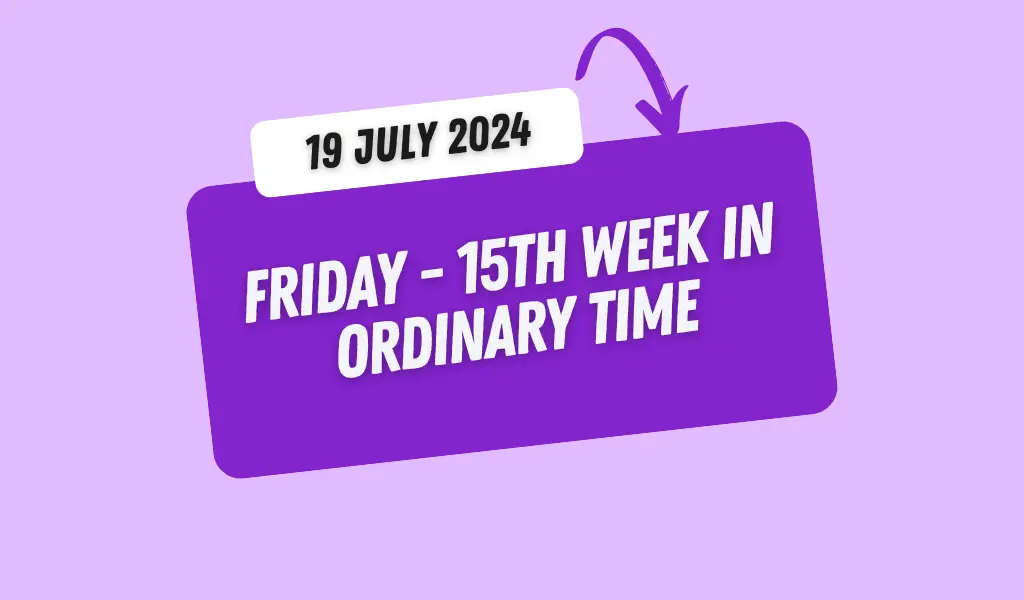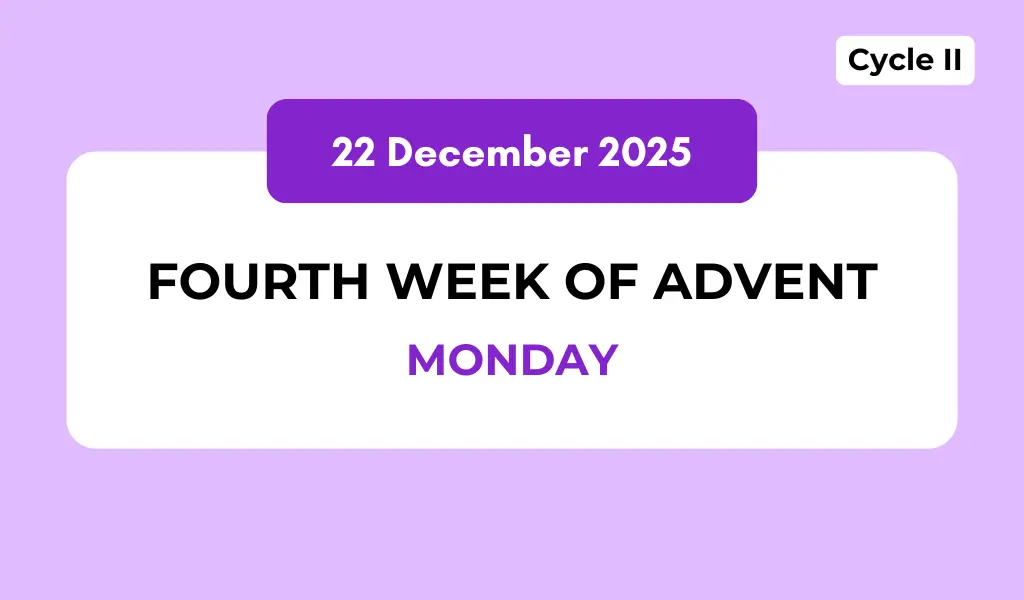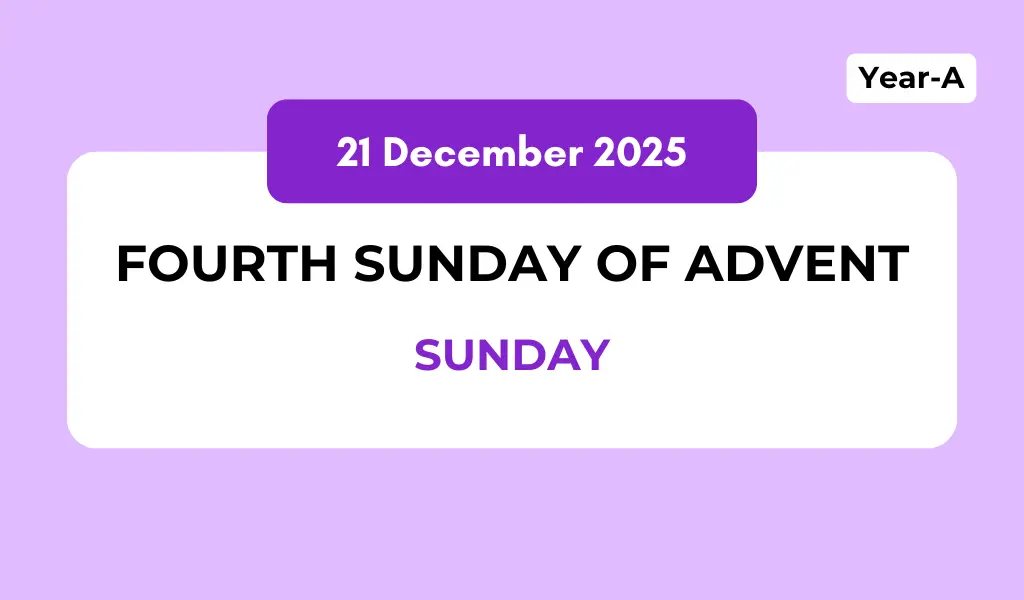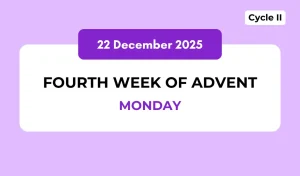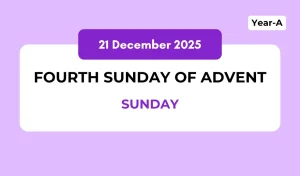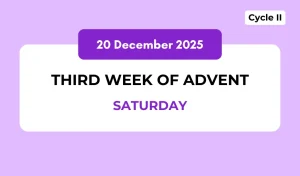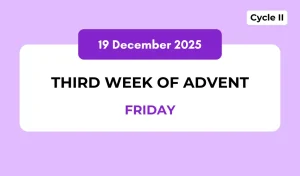Catholic Mass Readings and Reflection July 19, 2024
Fifteenth Week of Ordinary Time
19th July 2024 (Friday)
Psalter: Week 3
Reading of the Day
First Reading: Isaiah 38:1-6, 21-22, 7-8
In those days, Hezekiah became sick and was at the point of death. And Isaiah the prophet the son of Amoz came to him, and said to him, “Thus says the Lord: Set your house in order, for you shall die, you shall not recover.” Then Hezekiah turned his face to the wall and prayed to the Lord, and said, “Please, O Lord, remember how I have walked before you in faithfulness and with a whole heart, and have done what is good in your sight.” And Hezekiah wept bitterly. Then the word of the Lord came to Isaiah: “Go and say to Hezekiah, Thus says the Lord, the God of David your father: I have heard your prayer; I have seen your tears. Behold, I will add fifteen years to your life. I will deliver you and this city out of the hand of the king of Assyria, and will defend this city. Now Isaiah had said, “Let them take a cake of figs and apply it to the boil, that he may recover.” Hezekiah also had said, “What is the sign that I shall go up to the house of the Lord?” [Isaiah answered,] “This shall be the sign to you from the Lord, that the Lord will do this thing that he has promised: Behold, I will make the shadow cast by the declining sun on the dial of Ahaz turn back ten steps.” So the sun turned back on the dial the ten steps by which it had declined.
Psalm Isaiah 38:10, 11, 12abcd, 16 (R. see 17cd)
R/. O Lord, you have delivered my soul lest it perish.
Gospel Acclamation
V/. Alleluia
R/. Alleluia
V/. My sheep hear my voice, says the Lord; and I know them, and they follow me.
R/. Alleluia.
Gospel : Matthew 12:1-8
At that time Jesus went through the cornfields on the Sabbath. His disciples were hungry, and they began to pluck ears of corn and to eat. But when the Pharisees saw it, they said to him, “Look, your disciples are doing what is not lawful to do on the Sabbath.” He said to them, “Have you not read what David did when he was hungry, and those who were with him: how he entered the house of God and ate the bread of the Presence, which it was not lawful for him to eat nor for those who were with him, but only for the priests? Or have you not read in the Law how on the Sabbath the priests in the temple profane the Sabbath and are guiltless? I tell you, something greater than the temple is here. And if you had known what this means, ‘I desire mercy, and not sacrifice,’ you would not have condemned the guiltless. For the Son of Man is lord of the Sabbath.”
Daily Gospel Reflection
Friday – Fifteenth Week of Ordinary Time
Guidelines: True religion is not only a matter of devotions and traditions but much more about doing good to those in need. Any religious practice that goes against helping others is not a sound one
1. Religious practices and traditions, rules, and injunctions are good and needed. They manifest the spirit of piety and devotion. They show in concrete how much we care about God. They open us to insights and inspirations. They act as balms for consolation, guidance, and strength. They discipline us and guard us against possible aberrations.
2. However, their fruit and effect cannot be limited only to the spiritual domain. Any true devotion must eventually lead one to a concrete life of fraternity in acts of charity. Acts of devotion without acts of benevolence are deficient and incomplete. Piety without fraternity is shallow. Adherence to the rules is important but not at the cost of neglecting the need of the other.
3. This shallow religion is seen in the Pharisees. The hungry disciples of Jesus pluck grain and eat on a Sabbath day. The Pharisees vehemently blame them for breaking the Sabbath. They interpret plucking the ears of corn as part of harvesting, a work forbidden on the Sabbath. How narrow-minded and perverted they were!
4. They do not bother about the hunger of their fellow humans; rather they over-bother about the law. They forget the fact that human well-being is more important than the mere keeping of the law. Jesus then had to remind them two things: that the “Son of Man is lord of Sabbath” and this means that all the laws are subservient to him and no law is above him. Second, “God desires mercy and not sacrifice”.
5. God desires mercy because He Himself is a God of mercy. We see an instance of this in the first reading from Isaiah. It is God’s mercy that takes into account the faithfulness of Hezekiah; looks mercifully on him in his time of terminal sickness; heals him and prolongs his life. God expects the same from us. The rigidity of our religious observances must be tempered by the tenderness of mercy.
Practice: The value of our religious duties and devotions is seen in the concrete acts of fraternity and charity. Claiming to be faithful to God but failing to be merciful is a contradiction and a farce!
